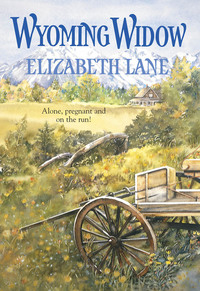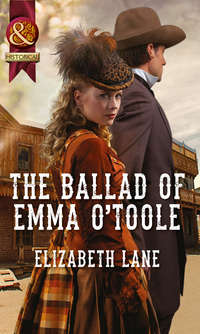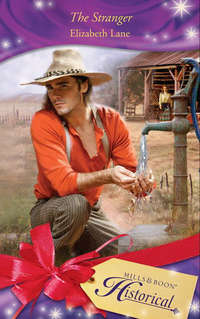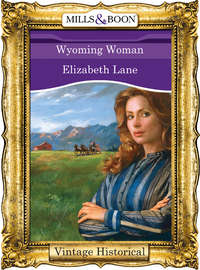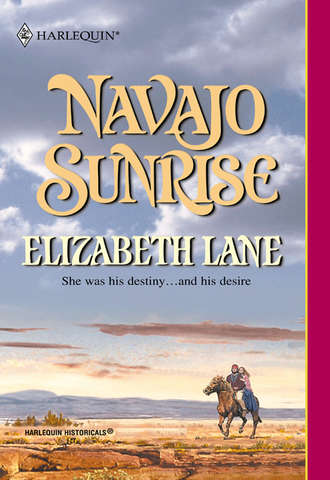
Полная версия
Navajo Sunrise

His black eyes flashed in warning,
but when he met her gaze, Miranda was overcome by the strange tenderness she saw there. Something moved inside her, warming, unfolding like the bud of a flower. Her lips parted as she struggled to break the silence with words that would not come.
“I know your heart is good, Miranda Howell,” Ahkeah said, “but your efforts to help the Dine will only make enemies for you—dangerous enemies, on both sides.”
“Including you?”
Time froze as he loomed above her, his eyes smoldering with unspoken secrets. His thin lips were sensually curved, his sharp bronze face much too close to her own.
“Including me?” His husky voice echoed her question as his gaze held her captive. “Make no mistake, bilagaana woman. You and I have been enemies from the first moment we set eyes on each other.”
Acclaim for Elizabeth Lane’s recent books
Bride on the Run
“Enjoyable and satisfying all around, BRIDE ON THE RUN is an excellent Western romance you won’t want to miss!”
—Romance Reviews Today (romrevtoday.com)
Shawnee Bride
“A fascinating, realistic story.”
—Rendezvous
Apache Fire
“Enemies, lovers, raw passion, taut sexual tension, murder and revenge—Indian romance fans are in for a treat with Elizabeth Lane’s sizzling tale of forbidden love that will hook you until the last moment.”
—Romantic Times
#607 HER DEAREST SIN
Gayle Wilson
#609 BRIDE OF THE ISLE
Margo Maguire
#610 CHASE WHEELER’S WOMAN
Charlene Sands
Navajo Sunrise
Elizabeth Lane

Available from Harlequin Historicals and
ELIZABETH LANE
Wind River #28
Birds of Passage #92
Moonfire #150
MacKenna’s Promise #216
Lydia #302
Apache Fire #436
Shawnee Bride #492
Bride on the Run #546
My Lord Savage #569
Navajo Sunrise #608
Other works include:
Silhouette Romance
Hometown Wedding #1194
The Tycoon and the Townie #1250
Silhouette Special Edition
Wild Wings, Wild Heart #936
Author Note
Navajo culture is so rich and complex that an outsider, trying to describe it in a story, is bound to make mistakes. For any errors contained in this book, I ask the forgiveness of my readers and all those whom my words may have offended.
Navajo Sunrise is set against a background of real historical events, but the story itself is the product of my own imagination. Except for Barboncito, Manuelito, Theodore H. Dodd and General William Tecumseh Sherman, the characters are fictitious and bear no resemblance to actual persons, living or dead.
Elizabeth Lane
Contents
Prologue
Chapter One
Chapter Two
Chapter Three
Chapter Four
Chapter Five
Chapter Six
Chapter Seven
Chapter Eight
Chapter Nine
Chapter Ten
Chapter Eleven
Chapter Twelve
Chapter Thirteen
Chapter Fourteen
Chapter Fifteen
Chapter Sixteen
Chapter Seventeen
Epilogue
Prologue
New Mexico
March, 1864
Ahkeah stood in the cold moonlight, staring down at the grave the bilagáana soldiers had forbidden him to dig. His hands were raw and bleeding, the nails worn to stubs from scraping away the half-frozen earth. His eyes and throat stung as if he had just walked through a forest fire.
Even now that the grave was finished, the top piled high with stones, he feared it might not be deep enough to protect his wife’s body from the marauding foxes and coyotes that would close in after he was gone. She had died that afternoon, on the fifth day of the long walk from Dinétah to the place the soldiers called Fort Sumner—died in agony, her body swollen with a child that would not have lived even if she’d had the strength to give it birth. The passing soldier who’d fired a bullet into her temple had probably done her a kindness. Even so, it had taken three of Ahkeah’s friends, gripping him from behind, to keep him from leaping on the blue-coat and tearing him apart with his bare hands.
At the time he had wanted the soldier to shoot him as well. He had wanted nothing more than to lie on the icy ground beside the body of his sweet young wife, free from the burdens of grief and shame and from the hunger that gnawed at his vitals. But even then reason had whispered that it was his duty to live. There were people who needed him—his small daughter, Nizhoni, whose name meant beauty, and his mother’s elder sister, who had watched her entire family die on the cliffs at Canyon de Chelly, and had not spoken since. And there were others—so many others who needed his strength and his voice.
The crescent moon that hung above the mesa cast ghostly shadows across the desolation of the high New Mexico desert. Through the darkness, the lonely wail of a coyote drifted to Ahkeah’s ears. The yelping cry was echoed by another, then another. At one time Ahkeah would have welcomed the calls of his wild brothers. Now they only chilled his blood, because he knew that the sharp-nosed creatures would be gathering around the bodies of the Diné who had fallen along the trail.
He had begun scraping out the grave as soon as he knew his wife was dead; but the soldiers, jabbing him with the points of their bayonets, had forced him to leave her and move on with the rest of his people. Only after the dismal procession had made camp for the night and settled into sleep was he able to slip past the sentries and race back along the trail to where she lay.
Now the grave was finished. The remains of his beloved were as secure as he could make them. But how many others lay unburied along this trail of tears and misery? How many bones would lie scattered on the sand because there was no one to dig the graves?
Turning in the darkness, he faced the direction of the four sacred mountains that marked the boundaries of Dinétah, the homeland of his people. There, the great headman Manuelito and the last of his followers were still holding out against the overwhelming forces of Kit Carson and his regulars. Ahkeah longed to be with them in the mountains, to fight and die as a free man.
But Manuelito himself, his handsome face creased with weariness, had asked him to join the trek to the new reservation at Bosque Redondo, the place the Diné called Hwéeldi—the fort. “Our people will need you, Ahkeah,” he had said. “You grew up as a slave among the bilagáana, and you speak as they do. Go now, and be the voice of the Diné in this evil time. Go and speak for us all.”
Speak for us all.
Swallowing his bitterness, Ahkeah turned away from the sacred mountains and started back the way he had come. What words could he speak that were not hateful and angry? At one time the Diné had been the lords of the earth, their herds, fields and orchards the envy of all the land. He himself had owned more cattle and horses than a man could count in half a day, and his beautiful wife had worn robes of soft wool from her own sheep and necklaces of the finest silver. Then the bilagáana had come, wanting their land, and everything had changed.
Be the voice of our people, Manuelito had told him. But the Diné needed more than a voice. They needed food in their bellies and clothes on their backs. They needed dignity, hope and pride—things the bilagáana had taken away and flung far beyond their reach.
Perhaps forever.
Ahkeah moved with care as he neared the sleeping camp, slipping from shadow to shadow in the moonlit darkness. Even at this hour the sentries would be on patrol. If they caught him outside the boundary…
His pulse lurched as a flock of wood doves exploded, squawking, from the spidery branches of a creosote bush. Had the startled birds alerted the sentries? Ahkeah froze where he stood, ears straining, hearing nothing but the sound of departing wings.
What if the soldiers had already missed him? What if they were waiting for him in camp, knowing he would return to his precious daughter? Some of the blue-coats were just following orders. But there were vicious brutes among them, men who would relish the chance to make an example of any Diné who broke the rules—especially one who spoke to them as a man, in their own language.
The wind peppered Ahkeah’s face with blowing sand as he crept along the fringe of the camp. The huddled forms of his people lay scattered on the cold ground where they had fallen. Here and there, where the soldiers slumbered in their warm blankets, the embers of dying campfires glowed in the night.
He had left Nizhoni with her old aunt in the lee of a sheltering rock, beyond the supply wagon. If he could manage to cross that last small distance without being seen…
But it was already too late. Ahkeah saw four soldiers, armed with clubs, step out from behind the wagon, and he knew they had been waiting for him. Glancing to one side, he saw others appear out of the shadows. Their pale eyes reflected glints of firelight as they encircled him, cutting off all hope of escape.
Cursing and whooping, they fell on him like a pack of hungry wolves.
Chapter One
Bosque Redondo, New Mexico
March, 1868
Miranda Howell hunched wearily on the seat of the U.S. Army buckboard, her slim body bundled into the folds of her thick woolen cape. The cold spring wind stung her cheeks and peppered her face with alkali dust. Two weeks from tomorrow would be Easter Sunday, but nothing about this desolate sweep of country made her feel like celebrating.
“I didn’t realize New Mexico would be so cold,” she murmured, her eyes scanning the treeless horizon. “It’ll be dark soon. How much longer before we reach the fort?”
“Not long. ’Bout an hour, I reckon.” The pimple-cheeked young corporal was one of nine soldiers who’d drawn the duty of escorting the major’s daughter the 175-mile distance from Santa Fe to Fort Sumner. The other eight rode guard on the wagon, four strung out in front and four bringing up the rear. Their rifles lay across their saddles, loaded and ready. For coyotes, they’d told her, exchanging furtive winks.
In the early hours of the journey, Miranda had made an effort to smile and be pleasant with them. But after four long days of travel she was too tired to be sociable. Her eyes stared across the desert landscape, which glowed like brimstone in the light of the setting sun. A lone crow screeched harshly as it passed overhead, then flapped down behind a clump of rocks, where, judging from the odor, some ill-fated creature lay dead.
What could have possessed any sane group of men to build a fort in such a dreary place? Miranda wondered. For that matter, what was she doing here? She could have chosen to spend the holiday with Phillip’s parents on Cape Cod. Their seashore estate would be beautiful this time of year, and they had made it clear that, as their future daughter-in-law, she would be more than welcome. Why had she chosen to spend the next two weeks a thousand miles from nowhere, with the rough and taciturn father she scarcely knew?
“We ought to be seein’ Navajos afore long,” the young driver said. “They got their diggins’ all over the flat.”
“Diggings? You mean to say they’re miners?” Miranda asked, trying to imagine what might lie beneath such barren, lime-encrusted earth.
“Miners? Them Injuns?” The young driver snorted contemptuously. “Shucks, no. They dig themselves holes in the ground to keep out of the weather—lessn’ they can find some old hides or sheets of tin to put up for a shack. Why should the lazy buggers mine or farm or even hunt when they can live on handouts from the good old United States Government?”
“You mean, they have no houses? No means of employment?” Miranda asked, horrified.
“Hell—” the young man swore, then broke off and began again. “’Scuse me, miss, but they’s Navajos. An’ Navajos got their own ways of doin’ things. General Carleton, afore he got his butt—’scuse me again, miss—afore he was dismissed from runnin’ this place, he got the idea of havin’ ’em build big adobe apartment houses like the Pueblos got. Right smart idea, if you ask me. But the Navajos, they wouldn’t have none of it. Wanted to live apart in their own kind of houses, little round huts they call hogans. Finally Carleton just threw up his hands and told ’em to go ahead! But did they build any hogans? Did they build anything a’tall? Look around you!”
The corporal worked his tobacco out of his cheek and spat over the edge of the wagon. “Only thing Navajos is any good at is forgin’ fake ration tokens so they can steal more supplies! Now that Carleton’s gone there’s been talk of movin’ ’em out, most likely to the Injun Territories in Oklahoma. Good riddance, I’d say. But nobody’s holdin’ their breath for that, I tell you, ’specially now that the Injun Bureau’s took ’em over from the army. Danged government bureaucrats won’t do much more’n hand out more flour and blankets.”
“But what a wretched way for people to live!” Miranda exclaimed in genuine horror. “No work, no homes, no dignity! Surely someone could help them, teach them—”
“Beggin’ your pardon, miss, but the Navajos brought their troubles on theirselves. They was raidin’ and murderin’ over half of Arizona afore Kit Carson and his boys brought ’em to heel an’ marched the lot of ’em here to Bosque Redondo.”
“Bosque Redondo?” Miranda frowned. “That means round grove in Spanish, doesn’t it? I certainly don’t see any grove in these parts!”
The corporal snorted with laughter. “Weren’t no more than a few trees to begin with, and the Navajos cut those down for firewood the first winter. Now there’s no shade in summer and nothin’ to burn when it gets cold. Never think past tomorrow, them murderin’ redskin fools. If you ask me, Carson shoulda killed ’em all while he had the chance!”
Miranda pulled her cloak tighter about her shoulders, willing herself to ignore the young driver’s unsettling talk. It would not do for her to get caught up in this Navajo business, she lectured herself. She had come to New Mexico to spend the holidays with her father, the last time they would be together before her June wedding, perhaps the last time ever. Nothing could be allowed to spoil their time together.
“There. Told you we’d be seein’ ’em soon.” The corporal’s nasal twang cut into her thoughts. Miranda leaned forward on the wagon seat. She shaded her eyes and scanned the horizon, expecting mounted savages to come whooping over the next rise. Only when the corporal nudged her arm and pointed sharply to the left did she realize her first Navajo was little more than a stone’s throw away.
Miranda turned, looked—and felt her heart contract with pity.
The old Navajo woman stood in the dust at the roadside, her withered body outlined against the blazing vermilion sunset. The desert wind whipped her faded rags against her bones, and the imploring hands that stretched upward like the thin branches of a winter tree shook with age and cold.
“Stop!” Miranda seized the corporal’s arm. The outriders swiveled their heads at the sound of her voice. They slowed their mounts, but did not halt.
“Didn’t you hear me?” Miranda tightened her grip, demanding the corporal’s attention. “I said stop the wagon! We’ve got to do something!”
His washed-out eyes stared at her blankly. “Do somethin’? For her, you mean? Lawse sake, miss, what for? That ain’t nothin’ but a dirty old squaw.” He spat another stream of tobacco over the side of the still-moving wagon. “Anyhow, we got to get you to the fort afore nightfall, or your pa will be fixin’ to throw us all in the stockade!”
He lifted the reins to slap them down on the backs of the plodding mules, but Miranda, anticipating the move, lunged forward, snatched the leather lines from his grip and jerked the team to an abrupt halt.
“What the hell—” the corporal sputtered.
“She’s not just a dirty old squaw. She’s a human being, and she needs help!” Miranda declared. “As for you and your fellow soldiers, if you don’t want to get involved, the least you can do is stand back and allow me to do what I can!”
The outriders had stopped now, and turned their mounts. They watched with varying degrees of amusement as Miranda lifted the skirt of her gray serge traveling suit and clambered down, unassisted, from the buckboard. None of them, it appeared, had the manners to help her or the compassion to aid a fellow being in need.
Over the past four years Miranda had read newspaper articles about the Navajos and how they’d been rounded up and force-marched from their homeland to the bleakness of Fort Sumner. But only now, at her first sight of a real Navajo, did the words she’d read take on life and meaning. In one shriveled face and a pair of twisted, begging hands, she saw the misery of an entire people. It tore at her heart and fueled her sense of outrage to a fever pitch.
The wispy-haired crone was clad in the remnant of a coarse woolen shift, handwoven in a striped pattern that might once have been colorful but was now faded and dirty, showing patches of warp where the weave had worn away. She shrank into herself as Miranda approached, her bare arms folding inward like the legs of a frozen insect. The small mewling noises she made scarcely sounded human.
“It’s all right, I won’t hurt you,” Miranda murmured, edging closer. She could see terror in the raisin-black eyes, and something else—something so disturbing that her heart crept into her throat.
“Give me those leftover biscuits from lunch,” she said softly, glancing up at the corporal in the wagon. When he hesitated, her eyes narrowed so sharply that he lunged to do her bidding. As the daughter of his commanding officer, Miss Miranda Howell was not without power.
Seconds later the biscuits were in Miranda’s hands. “Here, take them.” She held the food at arm’s length, standing quietly as the old woman crept toward her like a frightened, starving animal. “It’s all right,” Miranda urged gently. “No one’s going to hurt you.”
“I’d back off if I was you, miss.” One of the outriders spoke into the windy silence. “I know that old squaw. Crazy Sally, they call her. Hear tell she lit into a soldier one time and bit him on the arm. Tore him open so bad he needed stitches from the medic. No tellin’ what she might do to you.”
Miranda swallowed a knot of uneasiness as she chose to ignore the man’s warning. “It’s all right, Sally,” she coaxed, even more gently than before. “We don’t mean you any harm. Just take the food.”
Madness flashed in the ancient eyes as the old woman sidled closer. With a sudden move she snatched the biscuits away with her little clawed hands and scampered to the shelter of a dark sandstone outcrop. There she squatted on her haunches, glaring at Miranda while she stuffed the biscuits frantically into her near-toothless mouth. Saliva, mixed with soggy white crumbs, trickled down her chin. Miranda found herself wondering how Crazy Sally could have bitten anyone, let alone inflicted serious damage.
“All right, miss, you done it,” the wagon driver said. “You proved whatever you wanted to prove. Now let me give you a hand up and we’ll be headin’ on to the fort. You don’t want to be out here after dark.”
Miranda glanced up at him, still hesitant. The early spring wind, tasting of snow, plucked tendrils of her light brown hair and whipped at the folds of her woolen cloak as she turned back toward the old woman. Crazy Sally was still crouched against the rocks, her small black eyes narrowed to slits against the blowing dust.
“For the love of Pete, what is it now?” the wagon driver demanded.
Miranda’s eyes took in the old woman’s threadbare dress and exposed limbs. “We can’t just go off and leave her. There’s a storm blowing in. She’ll freeze before morning. Help me get her into the wagon. We’ve got to take her back to the fort.”
None of the soldiers moved.
Miranda’s gazed darted from one impassive face to the next. Some of the men averted their eyes, avoiding her furious gaze. Most of them did not bother. Had she pushed them too far this time?
“Beggin’ your pardon, miss.” The first outrider spoke up at last. “Ain’t none of us goin’ to lay a hand on that old squaw, let alone put her in the wagon.”
“If she ain’t got the sense to take shelter, let ’er freeze,” the corporal chimed in. “Good riddance to one more Navajo, that’s what I’d say. It’s what we’d all say.”
Miranda glared up at him in helpless rage. Phillip, her fiancé, had once accused her of being a flaming do-gooder who never knew when to leave well enough alone. He was undoubtedly right. Even so, she could not just walk away and leave a fellow human being to die.
“Very well.” She squared her shoulders and folded her arms across her chest. “If Sally stays here, then so do I. You can tell my father—”
“The major would hang us if we was to go off and leave you here,” the outrider interrupted. “We got orders to bring you safely back to Fort Sumner. With all due respect, miss, if we have to hogtie you and toss you in the wagon bed, that’s exactly what we’ll do.”
Miranda’s heart sank as she realized she had backed herself into an impossible corner. If she refused to get in the wagon, it would be an easy matter for nine men to move her by force. And, given the circumstances, her father would likely excuse their actions.
Her shoulders sagged in acquiescence. But there was one small victory yet to win, one last thing she could still do for poor old Sally, and this time, she vowed, no one was going to stop her.
Lifting her chin in defiance, she began unbuttoning the front of her long, hooded cloak. A birthday gift from Phillip’s family, the cloak had been woven in France from the finest blue merino wool and had likely cost a small fortune. Even now, the lush fabric caressed her fingers as she worked the buttons through their satin-bound holes. The wind was numbing in its chill. But she would be at the fort within the hour, Miranda reminded herself. And she could always buy another cloak, just as warm if not as elegant.
She waited for the soldiers to protest, but none of them spoke as she released the last button and slid the cloak off one shoulder. By now they probably thought she was as crazy as old Sally. Well, let them think whatever they wished. She would do the right thing, the moral thing, and the whole contemptuous lot of them could go to blazes.
The icy wind struck, penetrating to Miranda’s bones as the cloak slipped free of her body. She gasped with the sudden shock of it, then forcefully brought her reaction under control. This was no time to show weakness, she lectured herself. If old Sally could endure the cold, so could she.
Clenching her jaw against the urge to shiver, she turned back to the old woman, opened the cloak and wrapped it around the ravaged body. The garment was far too large for the tiny Navajo crone. Its elegant folds pooled around her where she squatted on her bony haunches, the lining already gathering dust. In no time at all the beautiful cloak would be filthy. But at least Sally would be warm. Heaven willing, she would survive the cold night with its blowing wind and snow, and many more nights to come.
“And just what do you think you’re doing?”
The voice was not loud, but its deep resonance, coming from behind and above her, made Miranda gasp. She turned so sharply that she lost her balance and stumbled to one side, wrenching her ankle. She caught herself against a jutting boulder, just managing to avoid an all-out sprawl.


